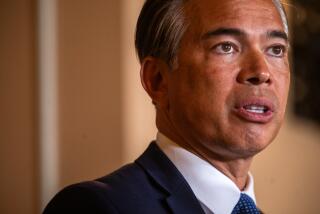LAPD Clashes With D.A.’s Office on Shooting : Law enforcement: Police refuse to turn over documents in investigation of woman’s slaying by officers. Grand jury is convened.
- Share via
The Los Angeles Police Department and the Los Angeles County district attorney’s office have squared off over a controversial police shooting case, with the LAPD refusing a request for documents on the incident and the district attorney convening a grand jury in response, sources close to the investigation said Thursday.
According to the sources, county prosecutors recently requested internal LAPD documents concerning the fatal shooting of Sonji Danese Taylor on a hospital rooftop Dec. 16. That request was rebuffed by LAPD commanders, who reportedly said they wanted to complete their inquiry before turning over their findings.
Frustrated in their efforts to secure that material, prosecutors then sent the matter to a grand jury, the sources said. That grand jury took sworn testimony last week from five police officers who witnessed the shooting, sources said, as well as from at least two civilians who were on the roof of St. Vincent Medical Center when Taylor was shot by two police officers.
Taylor suffered 10 gunshot wounds. Seven shots struck her in the back.
Neither prosecutors nor police officials would comment publicly Thursday on the standoff between the two agencies.
“It is not our position to comment in any way relative to the activities or investigations of any of the agencies looking into this matter,” said Cmdr. David J. Gascon, a spokesman for the LAPD. “Our position is that we have a responsibility to do a very comprehensive investigation and then present the facts uncovered in that investigation through the chain of command. The matter will be appropriately reviewed at every level, including the use-of-force review board and the chief of police.”
Other police officers said the district attorney’s decision to convene a grand jury angered the officers who were called before the panel, as well as LAPD officials. The officers who were forced to testify had just completed 12-hour earthquake duty, which colleagues said deepened the resentment that they and some other officers felt toward county prosecutors.
On the other side, however, prosecutors were said to be deeply frustrated by the LAPD’s unwillingness to supply evidence it has relating to the Taylor shooting. The Police Department has refused to turn over such material in the past, and prosecutors say it hinders their ability to quickly and completely review police shooting cases.
“If the district attorney has taken this to a grand jury, we think that’s the right step,” said attorney Johnnie L. Cochran Jr., who represents Taylor’s family. “We need some level of independence by the prosecutorial effort, and this may help ensure that.”
An initial LAPD press release on the Taylor shooting said she had a knife in her left hand and was holding her 3-year-old son in her right when officers found her on the hospital rooftop. Hospital security guards had called police after discovering Taylor on the roof, and police say Taylor was yelling “For the blood of Jesus!” while cradling her son and the knife.
The officers used pepper spray on Taylor and succeeded in forcing her to drop the child. At that point, however, they say she continued to threaten them with the knife. Two officers, Sgt. Michael Long and Officer Craig Liedahl, fired nine shots at Taylor, killing her.
A coroner’s report found that Taylor suffered a total of 10 gunshot wounds; one bullet may have struck her more than once. Seven of the bullets hit her in the back.
The LAPD and the district attorney’s office opened parallel investigations immediately.
Sources familiar with the inquiries said prosecutors briefly questioned four of the police officers but spent much longer with the fifth, a young probationary officer. The officers and other witnesses were asked about the details of the incident and were questioned about how seven of the nine bullets hit Taylor in the back, the sources said.
The grand jury has not subpoenaed Long or Liedahl. It is unusual for the grand jury to subpoena anyone who may be the target of a criminal prosecution because compelled statements by witnesses cannot be introduced as evidence at trial. Defendants have the right not to be forced to incriminate themselves.
Although grand juries have the authority to approve or reject a request to indict a criminal suspect, sources familiar with the Taylor case say this grand jury so far appears only to be investigating the matter. Neither police officers nor other witnesses can refuse to testify before a grand jury, so prosecutors can use the panel to secure evidence and testimony that they might otherwise be unable to obtain.
In addition to the district attorney’s inquiry and the internal LAPD investigation, the Taylor shooting is being reviewed by the FBI’s Los Angeles field division, which opened a preliminary investigation Wednesday.
That decision was applauded by several community groups Thursday, some of whom had written to the Justice Department to complain about the shooting and to call for a federal inquiry.
“We’re here to say thank you,” said Kahlid Shah, president of Stop the Violence/Increase the Peace Foundation. “The shooting of this young lady is totally unjustifiable, and it doesn’t matter if the police say she was disoriented or anything else.”
Michael Gipson, president of Youth Against Violence, agreed and said the community will monitor the progress of the investigations.
“The main thing is to let everyone know that we are prepared to follow this whole case all the way to the end,” Gipson said. Times staff writer Lisa Richardson contributed to this report.
More to Read
Sign up for Essential California
The most important California stories and recommendations in your inbox every morning.
You may occasionally receive promotional content from the Los Angeles Times.










